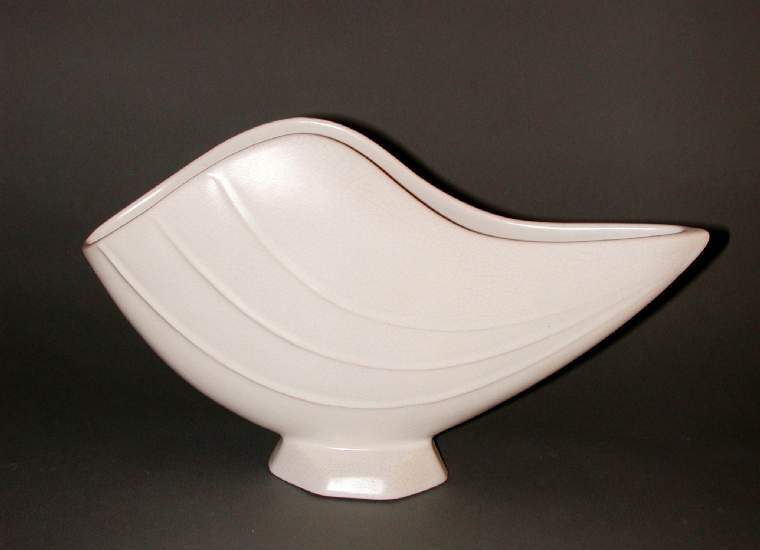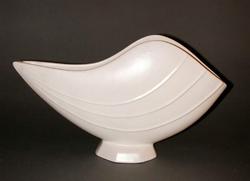Current Location: In storage
Titles
Asymmetric matt white vase
Maker(s)
Production:
Shorter & Son Ltd.
Entities
Categories
Description
Earthenware, slip-cast and covered with white 'Festival' matt glaze.
The bowl stands on a small, elongated octagonal base with sloping sides. Its two asymmetric sides are pushed together, creating a long, narrow opening at the top which is rounded at one end and slightly pointed at the other. The upper edges are similar to each other; towards the rounded end the rim rises up and falls again. The lower edges of the sides are joined, forming a part-circular shape. There are three moulded, sweeping curves on each side of the bowl, the ends splayed apart at the rounded end and gathered together into an open point at the other. The vase seems to balance on its small base, whilst the shape, mouldings and matt glaze convey a sense of lightness and flight. The underside is deeply recessed into the base, and glazed.
Legal notes
Given by Mrs Anne Robinson, 1997
Measurements and weight
Height: 18.1 cm
Length: 31.1 cm
Acquisition and important dates
Method of acquisition: Given
(1997)
by
Robinson, Ann, Mrs
Dating
20th Century, Mid
Circa
1951
CE
-
1955
CE
Note
Shorter & Son, founded in the 1870s, was part of a family group which also included A.J.Wilkinson and Newport Pottery. By the 1950s it was run by Colley Shorter with Clarice Cliff, by then his wife, as Artistic Director. In 1964, after Colley Shorter’s death, the Shorter & Son business merged with Crown Devon, and moved to Whieldon Road. The other two businesses were acquired by Midwinter.
This design, no.682, was produced in small and large sizes. It was one of a series of vases (nos. 681-90), all of futuristic shape, inspired by the 1951 Festival of Britain Exhibition on London’s South Bank. Introduced in the early 1950s with matt white glaze, the series later appeared in a variety of coloured matt glazes and in a high gloss black version with yellow and white highlights. The mark indicates that this piece was intended for the Australian market, where registration would be important to counter Japanese copies. Until 1952, wartime restrictions prevented the sale of decorated items to the home market; however, Shorter & Son was permitted to continue its exports, and actively marketed its wares in Australia, the USA and Canada.
School or Style
Contemporary
People, subjects and objects depicted
Components of the work
Foot
Width 7.5 cm
Materials used in production
matt white
Glaze
Earthenware
Techniques used in production
Slip-casting
: Slip-cast earthenware covered with matt white glaze.
Glazing (coating)
Inscription or legends present
- Text: 682
- Location: On base, in centre
- Method of creation: Moulded in relief
- Type: Mark
Inscription present: also another factory mark, moulded in relief, but indecipherable
- Text: SHORTER & SON LTD/ENGLAND/"AUSTRALIAN REGD./DESIGN APPLIED FOR"
- Location: On base, on inner side of footring
- Method of creation: Stamped in blue
- Type: Mark
References and bibliographic entries
Identification numbers
Accession number: C.1-1997
Primary reference Number: 71539
Stable URI
Audit data
Created: Saturday 6 August 2011
Updated: Tuesday 30 April 2024
Last processed: Tuesday 13 May 2025
Associated departments & institutions
Owner or interested party:
The Fitzwilliam Museum
Associated department:
Applied Arts





